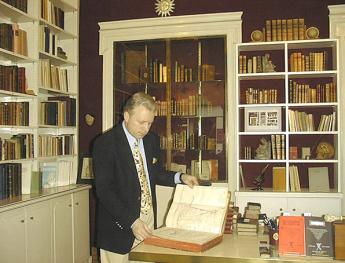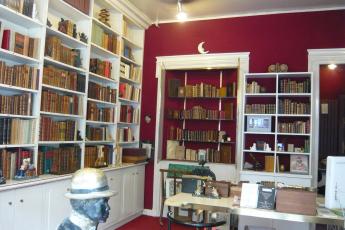Syndicat National de la Librairie Ancienne et Moderne L' Intersigne Livres anciens
Antiquarian Books Do Have a Future! - An Interview with Alain Marchiset

When did you start working in the antiquarian book business?
I started working as an employee in a Paris Bookshop in 1976, for a period of 9 years, after which, realising that I had become quite familiar with all aspects of the trade, I set up my own bookshop.
How did you become involved in the business?
Ive always been interested in books, and I started collecting old books when I was 17 years old somehow, it became a passion. What could be better than having ones profession and ones passion coincide?
What are your major activities? Are you specialised?
As I am curious by nature, I have always been interested by unusual subjects. This is why I specialise in curiosities. Of course it is related to the history of ideas in general, but more specifically the limits of human imagination. For example I deal in books on occult, but also books written by lunatics, as well as books on criminology, psychiatry, magic and conjuring I have published a collection of six catalogues on oddities and curiosities, a few on the history of science, and nearly fifty catalogues on occult subjects.
What was your most interesting catalogue?
I would like to tell you about the oddest and funniest catalogue I produced. It was in 1987. The catalogue is entirely devoted to mad-writers, lunatics and other mad scientists My wife and I laughed a lot while studying all these eccentric books, and within a short while, we had a hard time finding out what was or wasnt rational somewhat a dangerous experience! In another catalogue dealing in oddities, I even invented a book which was ordered by the Bibliothue Nationale. I was a bit embarrassed when I had to tell the curator that it was a joke, a fact which she did not seem to appreciate.
You have a beautiful shop in Paris near the Boulevard St. Germain. When did you start it?
I opened up my shop in 1985 rue du Cherche-Midi in the 6th arrondissement of Paris, between St-Germain des Pr and Montparnasse, and I havent moved since, it has always been an area with a number of booksellers.
You have been a member of the Syndicat National de la Librairie Ancienne et Moderne (SLAM) since 1988, were Vice President from 1998 to 2001, SLAM President from 2001 to 2003, and then President of honour. What are the major activities and the main aims of the SLAM?
The SLAMs main activity is to promote and to represent our trade especially when dealing with governmental authorities. As soon as a problem is detected, we talk about it with the concerned administrations. For example, I was in charge a few years ago of the circulation of cultural goods and the customs problems that it raised. The SLAM also organises each year a very important book fair at the Grand Palais, a very prestigious venue. It is a major event, but very tricky to organize. We also make sure that our members stick to the code of ethics we established with ILAB.
How many booksellers are there in France? Are they all organized in the SLAM?
In France, the SLAM is the only professional organisation of antiquarian booksellers, it regroups the major French booksellers, autograph dealers and a few photograph specialists. To this day, we are 242 members. However, there exists a large number of antiquarian and second-hand booksellers, often of a smaller size, who are not members of SLAM, usually out of individualism. Its a pity as only a strong association will allow the organization of large book fairs such as the annual one in Paris at the Grand Palais.
Book fairs: Many dealers dont exhibit, they concentrate on catalogues and/or the internet, whereas other dealers are seen everywhere in the world. Why are book fairs still important although we can meet almost everyone at any time virtually, in the internet?
The Fairs remain a major means of allowing customers and booksellers to actually meet. The larger Fairs offer such a concentration of high end dealers gathered under one roof that they remain an attractive event for bibliophiles. The Internet certainly offers some advantages but the transactions are anonymous, whereas when it comes to rare and expensive books, a relationship of trust between the buyer and the seller is a very important criteria.
Some people say that the rare book business has radically changed during the past 10 years. Most of them blame the internet or the Virtual Kultur as you called it in an article. What do you think?
We are now in the twenty-first Century and the World has indeed changed. Ive always been very involved with the sale of rare books on the Internet. I was in charge of Internet for the SLAM and for ILAB at the same time. At the beginning, I was full of enthusiasm, much less now. Looking back, some observations can be made. It has certainly radically changed the relationship between the customer and the bookseller. Before the Internet, a customer was faithful to a few booksellers where he was well known, regularly receiving their catalogues, and having privileged relations with them. Nowadays, the customer can access a worldwide offer, his choice is therefore much wider, and this has had a problematic consequence for booksellers: the books which used to be considered as scarce, which a bookseller only saw very occasionally, have now become way more visible because of the globalization, and thus the customers tend to think that these books are not so scarce as they were led to believe. This is regrettably only an optical illusion because the scale of comparison has been multiplied by an exponential factor. Thus, it is not reasonable to compare a market which used to be mostly national with todays worldwide market. The other negative aspect is that the websites allow an easier price comparison, which is to the buyers advantage, however this is more pernicious than it appears. The lower price is not necessarily the best one, and the bulk treatment on these sites does not allow the customer to distinguish the criteria which make that certain copies are more precious than others, whether because of their bindings, a dedication, an exceptional quality, or in contrast, pitiful or incomplete copies in very poor states Therefore, a greater visibility is not necessarily synonymous with a greater legibility, and the offer remains opaque for the buyer; which is why, after a period of euphoria quickly forgotten, the trust in the bookseller and the personal relationship with him will certainly become an important criteria for buyers, especially when it comes to bibliophily. The Internet introduces a levelling of all the information, there isnt any hierarchy of knowledge, the reader has to find his way among false information, rumours and real knowledge. This is also true of booksellers, all of them are on the same level, whether a renowned specialist who has a deep knowledge of his subject or a second-hand bookseller or even an amateur who tries to sell his book directly without the help of a bookseller. Confusion reigns. In time and after bad buying experiences, some customers have come back to more thoughtful and informed behaviour. The knowledge and experience of a professional is not acquired in one day, and this fact will remain an essential criteria of security for the buyer.
Another of your articles was titled Reply of a Gaul of the Old Continent to an Indian of the New World. What kind of differences do you see between the rare book markets in America, and Europe?
The American market is very different from the European one. In Europe, the clientele is mostly private, consisting of collectors and amateurs. In the USA, the clientele consists mostly of important institutions and larger universities. The attitude and psychology are therefore completely different, which is why I had found it useful to respond to the article of an American colleague, in which I explained that the rest of the world did not necessarily behave and think like his countrymen.
So, what is most important for a good rare book dealer?
Nowadays, the rare book professionals must first and foremost promote their knowledge and competence with the public, as due to the negative effect of the Internet, the customers are drowned in a mass of anonymous sellers most of which are relatively incompetent. It is important that the public knows that we guarantee the books we sell, that they are complete and accurately described and identified. It is a guarantee for the buyer. This is our challenge.
What can the ILAB do for the future of the rare book business?
The ILAB website must become a worldwide reference for customers, where they can find true professionals and not Sunday sellers who proliferate on the online auction websites. Our Code of Ethics is there to guarantee their acquisitions. ILAB also brings its quality label to the major international book fairs, which can allow customers to make the difference with local second hand book fairs.
What do you think about the future of our business in general?
Our trade has known in recent years very deep changes. We are hearing more and more often of the e-book, and it is not difficult to understand that in a few years the paper book will no longer be the cultural reference. I had also anticipated that fact in 2002 in another article What future for rare books, in which I explained that rare and antiquarian books would probably be safe from the breakdown of the new book market, because rare books will remain collectibles. As I said then, as the gap widens between books for consumer purposes and rare books, there will be greater distinction between them, and that such books will acquire greater value for collection purposes . There will therefore always be demanding amateurs for fine leather bindings, beautifully illustrated books on fine paper, original manuscripts, etc Can one really compare these beautiful artefacts to an e-book? Antiquarian books do have a future!
>>> LIntersigne
>>> Reply of a Gaul of the Old Continent to an Indian of the New World, by Alain Marchiset
>>> Virtual "Kultur", by Alain Marchiset


